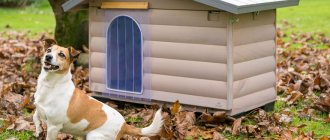- VetConsultPlus
- Informational portal
- The dog is sick
The average adult dog sleeps about 12-14 hours a day
, combining daytime sleep and nighttime sleep. Just like with people, sleep is key to a dog's health. It also helps your dog feel more rested and energetic.
Dogs with sleep disorders may whine, vocalize, or wake up frequently during the night.
, become more lethargic during the day, or seem more disoriented when performing normal tasks. Because sleep deprivation can cause a buildup of stress hormones, dogs with sleep disorders may also become more aggressive or exhibit other behavioral problems. In addition, lack of sleep can weaken your dog's immune system, increasing the risk of infection.
Here are four common types of sleep disorders that can occur in dogs and how to treat them.
Narcolepsy
Narcolepsy is a sleep and nervous system disorder
, which primarily affects young dogs. It is usually caused by a genetic disorder that results in abnormally low levels of a chemical called hypocretin, which helps maintain alertness and normal sleep. This genetic disorder can occur in Doberman Pinschers, Poodles and Labradors. Other causes of narcolepsy include obesity, inactivity, and immune system dysfunction. Sometimes the cause is unknown.
A dog with narcolepsy suddenly falls onto his side and falls asleep, usually after a period of excitement or physical activity (eg, eating, playing, greeting family members, etc.). The muscles will weaken and the dog will go into deep, rapid eye movement (REM) sleep. External stimulation - loud noise or petting will suddenly wake up the dog. Narcolepsy is sometimes associated with cataplexy, which is muscle paralysis.
Narcolepsy is not life-threatening or painful. Diagnosis is based on clinical signs, so video recording an episode of narcolepsy can help your veterinarian accurately diagnose the disorder.
Narcolepsy has no cure, but can be managed by identifying and minimizing the events that trigger it. Using comforting words and gentle petting may also help reduce the severity and duration of a dog's narcoleptic episodes. Depending on how much narcolepsy is negatively impacting the dog's quality of life, your veterinarian may prescribe medications that reduce hyperactivity, promote wakefulness, or manage the frequency and duration of narcolepsy.
Don't wake up your dog abruptly
The phrase is true: “Don’t wake a sleeping dog!” After all, 60% of child bites from pets occur when children wake up an animal that is in REM sleep. The reaction of animals at this moment is comparable to a human one, when a person is disoriented from a sudden awakening and can hit the person waking him with his hand, fall out of bed, etc. Therefore, it is important to explain to children that they should not wake up a sleeping dog or frighten it.
As cute as your puppy may be, he can also be annoying at night. Puppies are full of energy, they can wake up very quickly and out of the blue start barking, whining and running around the house like crazy at night. Crate or pen training and regular exercise will help you get through the difficult process of restoring your normal sleep schedule.
Get the energy out of your puppy
playing with it all day long. Puppies usually play for 30 or 60 minutes, after which they lose almost all their energy and replenish it after sleep. If they don't find a suitable way to spend their energy, then most likely they will force you to listen to their barking. Playing a game, a wild chase around the house, or a short walk will help you get your puppy to lay his head on his pillow at night.
Let your little buddy take a walk
just before bed. Try giving your puppy a short walk before bed or letting him out in the yard to help prevent whining and barking. If he wakes you up in the middle of the night, then he should probably walk or run again.
Plan a schedule for his last meal
for about three hours before he goes to bed. This will help ensure that he doesn't wake up hungry in the middle of the night and go looking for something to eat.
Start training him to be in a crate or pen.
. Crate training will provide your puppy with a safe haven. At first he will probably hate her, but he will soon learn to love his new refuge where he will feel safe. After training, he will also look for it every time he gets tired. During training, while he is in the crate, never pay attention to him until he stops whining, and train him no more than 2-3 times a day for a maximum of one hour. When you sleep, set up a crate or pen in your room to help your puppy relax better.
Make the cage comfortable enough
. Place a comfortable place to sleep inside the cage and, if necessary, line it with a blanket. Protect your puppy's new shelter from light by covering the top of it with thick enough material. Puppies can sleep on literally anything, but a soft surface will always be more attractive.
Keep noise levels to a minimum
. Puppies cannot tolerate external stimuli, especially sound, when they are trying to sleep. Therefore, before going to bed next to the puppy, it is not recommended to create unnecessary commotion or talk loudly. The less noise, the more likely it is that he won't wake up and jump and run around to check what's going on.
Place a quiet, non-squeaking toy in the crate to help keep your puppy occupied if he gets too excited to sleep. Use only safe toys that he cannot break or destroy while you are sleeping.
Don't disrupt your pet's naps during the day. Puppies need a colossal amount of sleep compared to us, which can easily reach 18 hours a day or more. If they don't get regular sleep, they can become fussy like a baby, which also leads to barking and whining.
Never yell or discipline your puppy while he's wandering or when it's time to sleep. No matter what you do or what steps you take, the first few nights with your puppy are likely to be rough. Once he has adjusted to the house and his new surroundings, he will sleep much more peacefully at night.
Never be fooled by your puppy's barking or whining. Unless he needs to go out in the middle of the night, ignore him. If you try to calm him down, or, worse, think that he just needs a couple of spanks with a belt, then he will know that this belt and a couple of screams will ensure your arrival and his salvation.
The duration of a dog's sleep is primarily influenced by its breed. Working shepherds, Rottweilers and Dobermans can get by with 8-10 hours of rest per day. Approximately the same duration is observed in active pets.
Huskies, Jack Russell terriers, and representatives of some hunting breeds have short hours of sleep, which alternate with active wakefulness. Large breeds such as St. Bernards, bullmastiffs, and Newfoundlands rest up to 14-16 hours a day.
Sleep problems most often occur in puppies. They are very worried about separation from their mother and their brothers and sisters and organize nightly “concerts” in their new home. It goes away quickly.
| Main causes of sleep disturbance in adult dogs | |
| Jet lag | In summer, animals may experience a significant shortening of the sleep stage, which is associated with an increase in daylight hours. Also, if the owner, for example, returns home late, this can shift the dog’s biological clock, and it will sleep less. |
| Emotional stress | The main reason is stress. Prolonged mental stress due to a change of place of residence, death of an owner or family member can deprive an emotional pet of rest for a long time. Nervous and sensitive individuals may suffer from insomnia, feeling a sense of fear, panic, and melancholy. New smells and even an unfamiliar place can cause anxiety and lead to insomnia. |
| Wrong daily routine | If walks outside are reduced to 10 minutes or less, this can sooner or later lead to a reduction in sleep. |
| Wrong vacation spot | If the bed is located in a noisy place, near heating devices, the animal may experience discomfort and often wake up. |
If the dog also wakes up the owner
, the reason may be some need, for example, if the dog is hungry or they forgot to give him a bowl of clean water. In this case, the owner should eliminate the cause of the animal’s insomnia and give the command “Place!”
Often an impulsive, ill-mannered animal can wake up household members.
You only have to do the wrong thing once - pet and play with the dog at night, and this behavior will become regular.
The reason why a dog sleeps poorly at night and asks to go outside may be a chronic disease:
indigestion, for example, or problems with the excretory system. Your pet may be bothered by pain, discomfort, or disruptions in the functioning of body systems. A comprehensive examination at a veterinary clinic will help determine the cause of insomnia in your four-legged friend.
The easiest way to start is by choosing the right place for your dog to rest.
The furry family member should have a specially designated place to rest. Many owners of decorative dogs are mistaken when they allow their friends to rest in the master bed or on the sofa.
Rules for choosing a place for a dog to sleep:
- The sleeping place should not be placed in a walk-through room or a noisy room. The dog's sensitive hearing and sense of smell will make it wake up from the slightest rustle.
- The place should be away from drafts, dampness and direct sunlight.
- Avoid proximity to heating appliances. Dogs do not tolerate heat well and their sleep will become shorter.
- The best place for a furry pet to sleep is in a separate room or the far corner of the room. Do not place a rug or bed in the owner's bedroom.
- The size of the soft bedding must correspond to the size of the animal. A shaggy dog with a thick undercoat often ignores warm bedding and prefers to sleep on the bare floor. It is worth choosing a special bed with cooling.
To learn how to choose a dog bed, watch this video:
To train a dog to a place
, first of all, you should take a closer look at what place the dog chose to rest. If it corresponds to the ideas of convenience and rationality, then the bed can be placed there.
Reception will help:
after the dog has eaten, it must be called to the mat and given the command “Place!” and give them a treat. Having the owner's worn item placed nearby will also help. The familiar smell will calm the animal and teach the dog to sleep on the bed.
Ways to adjust a dog’s biorhythms:
- Follow the daily routine strictly. Feed, walk and walk the dog at strictly defined times. After 1-2 weeks of this regime, the dog’s biological clock will be restored.
- Walks in the evening should be longer. In the beginning, you should include active games and exercises. 10-15 minutes before returning home, the animal should be put on a leash and walked with it at a calm pace.
- In the evening, it is necessary to stop the pet’s active actions. The animal should be calmed down and sent to a resting place, treated with a treat.
Read more in our article about why dogs don't sleep well.
Read in this article
Insomnia
Insomnia is rare in dogs and usually indicates another health problem.
It may be caused by physical health problems that are illness (such as arthritis or injury), itching (such as fleas), or causing frequent urination (such as kidney disease or diabetes). Anxiety, stress and pent-up energy can also lead to insomnia. Particularly in older dogs, cognitive dysfunction caused by brain degeneration can disrupt normal sleep patterns and cause insomnia.
Your veterinarian will be able to determine the underlying problem and prescribe appropriate treatment.
For example, pain medications can relieve pain associated with arthritis, leading to better, more comfortable sleep. Acupuncture can improve sleep by reducing pain and anxiety, and even help with kidney function. For older dogs with cognitive dysfunction, diets rich in omega-3 fatty acids may improve brain function, and melatonin may regulate the sleep-wake cycle, which promotes better sleep.
Other strategies for relieving insomnia include increasing physical activity during the day, scheduling playtime before bed, making the sleep area more comfortable (such as purchasing an orthopedic bed for a dog with arthritis), and using aromatherapy with lavender and chamomile in the sleep area.
What is the reason if the dog does not sleep well?
Pets spend almost half of their lives in the kingdom of Morpheus. The duration of sleep is primarily influenced by the breed of the dog. Thus, working shepherd dogs, Rottweilers and Dobermans can get by with 8-10 hours of sleep per day. Approximately the same duration of rest is observed in active pets.
Huskies, Jack Russell terriers, and representatives of some hunting breeds have short hours of sleep, which alternate with active wakefulness. Large breeds, such as St. Bernards, bullmastiffs, and Newfoundlands, are not averse to sleeping longer, up to 14-16 hours a day.
The owner, as a rule, faces the problem of sleep disturbances in a four-legged family member if a small puppy appears in the house. Young animals are often very worried about separation from their mother and their brothers and sisters and organize nightly “concerts” in their new home, not wanting to rest. However, a situation often arises when an adult dog sleeps poorly and disturbs the household.
Experienced dog breeders and veterinary specialists include the following among the causes of sleep disturbance in animals:
- Biorhythm disturbance . The dog's body obeys subtle biological laws. In this regard, in the summer, animals may experience a significant shortening of the sleep stage, which is associated with an increase in the duration of daylight hours. Often the pet lives according to the schedule of the household. If the owner, for example, returns home late, this can shift the dog’s biological clock, and it will sleep less.
- Emotional stress . Stress has the most negative effect on an animal's sleep duration. Prolonged mental stress due to a change of place of residence, death of an owner or family member can deprive an emotional pet of proper rest for a long time.
- Sleep disturbance is often observed in nervous and sensitive individuals. Such pets may suffer from insomnia, feeling a sense of fear, panic, and melancholy. New smells and an unfamiliar place can cause anxiety in the animal and lead to insomnia.
- an incorrect daily routine leads to sleep disturbances in a four-legged friend . If the dog spends little time in the fresh air, walks on the street are reduced to a 10-minute walk, then sooner or later this can lead to a reduction in the duration of rest.
- The cause of a pet's restless sleep is sometimes the wrong place for the dog to sleep . If the bed is located in a noisy place, near heating devices, the animal may experience discomfort and often wake up.
We recommend reading about why a dog barks at night. From the article you will learn about why a dog barks at night, what to do to calm your pet, and how to stop a dog from barking at night.
And here is more information about why a dog whines.
If it wakes up the owner
Often, four-legged pets not only keep themselves awake at night, but also wake up household members. The reason for this behavior may be some need, for example, if the dog is hungry or they forgot to give him a bowl of clean water. In this case, the owner should eliminate the cause of the animal’s insomnia and give the command “Place!”
Often an impulsive, ill-mannered animal can wake up household members. You only have to act ignorantly in the current situation once - pet and play with the dog at night, and this behavior will become regular.
If he asks to go outside
According to veterinary experts, the reason that the dog does not sleep well at night and asks to go outside may be a chronic disease. Digestive disorders, such as diarrhea or problems with the excretory system, force the animal to wake up in the middle of the night and wake the owner.
Your pet may be bothered by pain, discomfort, or disruptions in the functioning of body systems. A comprehensive examination at a veterinary clinic will help determine the cause of insomnia in your four-legged friend.
Sleep apnea
Sleep apnea is usually rare in dogs. However, it is common in obese and flat-faced dogs such as English bulldogs, Boston terriers and pugs. In sleep apnea, excessive visceral fat or abnormal respiratory anatomy can temporarily widen or narrow the airways, causing the dog to stop breathing for 10 to 20 seconds at a time, which manifests as abrupt awakening and restlessness. These ongoing sleep disturbances can cause your dog to feel tired and lethargic during the day. Loud, chronic snoring is a common sign of sleep apnea. Treatment options include weight loss for obese dogs, surgery, and steam humidifiers.
Without treatment, sleep apnea can be life-threatening. If your dog snores loudly and constantly wakes up during the night, seek veterinary treatment as soon as possible.
Place to sleep
The place you choose for your puppy to sleep and rest should evoke only positive emotions in him. It should be warm, comfortable and close to those parts of the house that the puppy likes. It is allowed to place next to the small pet some thing or toy that is dear to him. You can leave the radio on at minimum volume. Before going to bed, try to pet and calm your baby!
It is important that your pet’s sleeping place does not have any additional functions, such as a place for punishment for disobedience. This situation will lead to additional stress. The kid will definitely decide that he is being punished.
REM behavior disorder
Does your dog chase a squirrel in his sleep?
If so, he may have something called REM behavior disorder, which causes physical activity during sleep. For some dogs, this activity can become extreme or violent, such as crashing into walls or attacking inanimate objects. Dogs with REM behavior disorder usually wake up without any confusion or disorientation, which distinguishes this disorder from a seizure. Treatment with the drug clonazepam will reduce activity during sleep.
If you notice any changes in your dog's sleeping habits, take him to the vet as soon as possible. Do not try to diagnose or treat a sleep disorder yourself, as this may prolong your dog's poor sleep quality.
During the appointment, your veterinarian will first perform a physical examination and then perform other tests necessary to diagnose your dog's sleep disorder. Once the disorder is properly diagnosed, work with your veterinarian to create a treatment plan that will effectively manage the disorder and help your dog sleep better.
^Top
Why doesn't the dog sleep
Nervous, sensitive individuals may experience restless sleep. If your pet sleeps less than average, you can move its sleeping place to a more secluded, secluded, quiet place.
If your pet frequently wakes up at night and becomes active, it may not be getting enough exercise during the day. A similar problem is common in families where the pet sits alone at home all day, and the owner, tired after work, takes him for a walk in 10 minutes. It is known that a tired and well-fed dog sleeps long and soundly. Therefore, it is important to walk your pet for as long as possible before going to bed, physically loading it.
Animals have a heightened sense of hearing and smell. It is likely that your pet is awakened by an unfamiliar smell or sound.
Stress affects sleep duration. Therefore, you need to find out the cause of stress and then take the necessary measures to eliminate this cause. So, if an animal finds itself in a new home, then you need to give it time to adapt.
Good to know
- Dog breathing problems?
- Why does my dog often vomit yellow or white foam?
- Why doesn't the dog eat anything? The dog doesn't eat?
- Why does a dog scratch its ears and shake its head?
- The reason why your dog constantly whines?
- Why is my dog breathing heavily and frequently?
- Why does a dog eat cat feces?
- Why does a dog drink a lot of water?
- Eye discharge in dogs
- Why does a young dog have bad breath?
- Why does a dog lose hair?
- Why does my dog have diarrhea? Dog diarrhea
- How to treat bartonellosis in dogs
- Bordetelosis and Bordetella in dogs
- How to treat adenovirus in dogs?
- Why is the dog lethargic?
How to accustom an animal to a place to sleep
The owner will not have any difficulties in accustoming a dog to a place to sleep if he listens to the advice of dog handlers. First of all, you should take a closer look at what place the dog chose to rest. If it corresponds to the ideas of convenience and rationality, then the bed can be placed in your favorite place.
You can accustom your pet to a new resting place using the following technique. After the dog has eaten, it must be called to the mat and given the command “Place!” and give them a treat. The owner's worn item placed nearby will help to effectively train the dog to sleep in a designated place. A dog associates a familiar smell with safety and will quickly teach him to sleep on a bed.
Watch this video on how to train your dog to sit:











